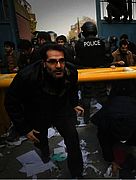Khamenei Criticizes Attack on British Embassy
» Remarks That Were Censored Even on the Leader’s Site
Nine months after a group of para-military Basij students and elements of Ansare Hezbollah attacked the British embassy in Tehran, the supreme leader of Iran criticized the attack while labeling the embassy as “evil.” Interestingly, ayatollah Ali Khamenei’s official website on Twitter posted this criticism of the students while the two official websites of his office did not carry these comments. Earlier, during a Friday prayer event in June of 2009 at the height of public protests against the official presidential election results, Khamenei called the British government “the most evil government in the world.”
Speaking to a group of students, most of whom were members of the pro-government Basij militia, the leader of the Islamic regime said on Monday, “On the recent attack of the evil embassy, the feelings of the young people were right, but their behavior was not right.”
Khamenei’s disapproval of the behavior of the Basiji students and the members of the Ansare Hezbollah, a semi-official paramilitary organization whose members engage in violent acts against those they consider to be not Islamic enough or at one time who were critical of the government or the regime, is related to the attack that members of the two groups staged on the British embassy resulting in physical damage to the gates, buildings, interior and even historic documents of the embassy in Tehran. The attackers seemed to have easily passed through the security parameter around the embassy made up of numerous security agents and apparently did not meet any serious resistance on their way.
At the same time as the attack on the British embassy was in progress in downtown Tehran, another group from the same organizations attacked the British compound in the northern part of the capital. The embassy invaders were subsequently driven out of both compounds through the intervention of special police forces.
According to the remarks posted on the official site of the office of the supreme leader on Monday, Mr. Khamenei also told the visiting students, there is no contradiction “between the idealism of students, interest considerations of the country and lawful and thoughtful actions and management.”
In his words of disapproval, Khamenei said, the behavior of the students stemmed from “young age, feelings and idealism,” but one can act in a manner that does not create a conflict with the management and interests of the country.”
Khamenei’s remarks associate “emotional decisions” with negative consequences” for the country even though he has in recent years been praising pro-regime student organizations who are active in social-political events of the country, while saying, “During these very years there have been acts committed on pure and sacred emotions of students and groups which were not proper.”
On Twitter Rather than the Official Website
The remarks that were published on the official website of the office of the supreme leader regarding the latest meeting and comments of the leader did not include the disapproving remarks of some student actions. It appears that because the site on Twitter was covering the ayatollah’s Monday meeting with the students in real time, the disapproving remarks made their way into the site as well, whereas the edited versions of the remarks and report of the meeting that were posted hours later on the official sites of the office of the supreme leader (non on Twitter) did not carry this criticism.
Domestic media in Iran are allowed to only quote or re-publish those comments of ayatollah Khamenei that are presented to them through his office, which includes a specific headline.
Following the attack on the British embassy compounds in Tehran, the British government held an emergency meeting and decided to shut its offices there, and expel the Iranian diplomats and embassy staff in the UK and shut that embassy as well. Diplomatic relations between the two countries have not been restored since then.
The US, the European Union, the UN Security Council and a number of other governments around the world strongly condemned the attack on the British embassy in Tehran and reminded Tehran of its international and conventional responsibilities in protecting foreign missions according to international conventions to which Iran is a signatory.
Inside Iran, different responses followed the attacks on the embassy, with some supporting the action while others, such as the administration of Mahmoud Ahmadinejad, criticized it. The foreign ministry of Iran condemned that attack as “irresponsible behavior” and said that the government respected international rules and law on the immunity of diplomatic missions. On a number of occasions, the administration said it had nothing to do with the attacks. The speaker of Iran’s parliament, Ali Larijani, however, endorsed the attack by labeling it “the symbol of Iran’s public opinion.” He accused Britain of pursuing harmful behavior towards the people of Iran during the last five decades.


